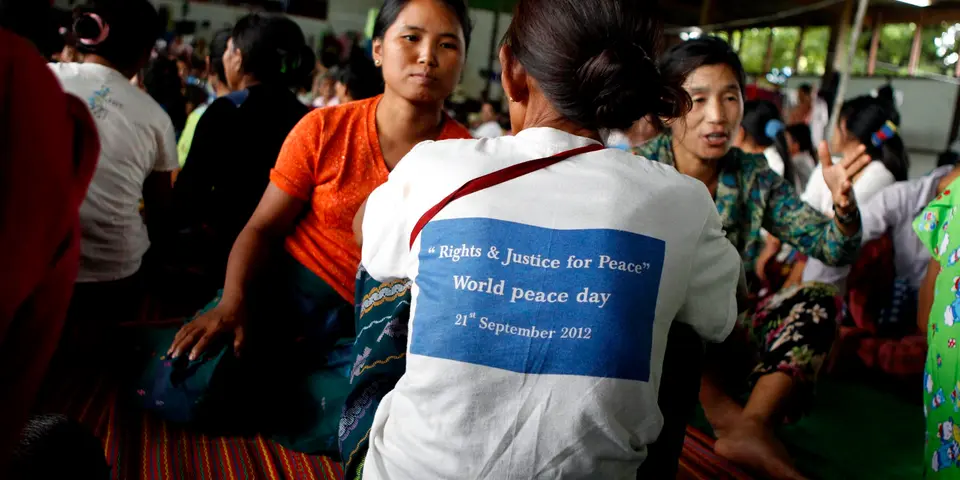
APHR FFM Reveals Alarming Crisis: ASEAN Must Demand Permanent Ceasefire and Protect Myanmar’s Refugees and Political Prisoners
May 02, 2025

JAKARTA, 2 May 2025 — The ASEAN Parliamentarians for Human Rights (APHR) has concluded its Fact-Finding Mission (FFM) to Mae Sot, Thailand, conducted from 28 April to 1 May 2025. The mission reveals a deteriorating humanitarian and political crisis along the Thailand–Myanmar border, exacerbated by ongoing military aggression, reduction of humanitarian aid, and regional diplomatic inertia.
Four years after Myanmar’s military coup, the junta continues to perpetrate widespread atrocities with impunity, including airstrikes against civilians, forced conscription, torture, and sexual violence. Mae Sot, historically a refuge for displaced Myanmar communities, now hosts overstretched civil society actors, informal schools, and makeshift shelters, struggling to protect without legal recognition or formal support.
The Thai government’s suspension of cross-border visas at Friendship Bridge No. 1 has severed a critical route for humanitarian actors and those fleeing violence, increasing refugees’ vulnerability to exploitation and abuse.
The crisis is further compounded by the withdrawal of major humanitarian donors, notably the US humanitarian assistance, and the devastating 7.7 magnitude earthquake on 28 March 2025. The earthquake resulted in over 3,800 deaths and more than 5,100 injuries, leaving millions in urgent need of assistance.
Although the military junta declared a ceasefire to enable humanitarian aid, it has continued aggressive operations—including airstrikes and artillery shelling—even after the ceasefire was meant to take effect on 2 April. This natural disaster has been tragically exacerbated by man-made destruction, as airstrikes struck several quake-affected areas. According to the Armed Conflict Location & Event Data Project (ACLED), at least 172 attacks occurred during the ceasefire period, 73 of them in earthquake-hit zones.
“You cannot deliver aid through those who bomb hospitals and arrest medics,” said Charles Santiago, APHR Co-chairperson and former Member of Parliamentarian from Malaysia. “The junta’s weaponization of health and humanitarian access must end. ASEAN must act with moral clarity—not diplomatic caution.”
Equally alarming is the escalating repression within Myanmar’s prison system. As of March 2025, the Assistance Association for Political Prisoners (AAPP) reported over 22,100 individuals charged by the junta since the 2021 coup, with more than 10,700 sentenced. While the regime proclaimed a mass amnesty in April 2025, releasing nearly 4,900 prisoners, only 380 were political detainees.
Between September and December 2024 alone, at least 87 individuals died in custody, many due to torture, denial of medical care, and inhumane treatment. The continued incarceration of elected officials, journalists, human rights defenders, and student activists illustrates the regime’s ruthless campaign to silence dissent.
Emmi de Jesus, APHR member and former Member of Parliament of the Philippines stressed: “The junta’s continuation of military offensives and mass detentions amidst a humanitarian disaster is indefensible. The international community, especially ASEAN, must respond not with platitudes, but with principled, coordinated pressure.”
APHR calls on ASEAN and its member states to rise to the challenge with urgency and resolve:
- Thailand must extend legal protection to Myanmar refugees, including access to work, healthcare, education, protection and humanitarian aid, keep the border open and provide safe passage to people fleeing.
- ASEAN must urgently initiate a comprehensive humanitarian architecture and funds by establishing a regional cross-border aid mechanism, with transparent disbursement and oversight, that bypasses the junta.
- ASEAN must also exert sustained pressure on the Myanmar military and all armed actors to cease attacks on civilians and the indiscriminate use of explosive weapons in populated areas. Compliance with international humanitarian law and human rights obligations—particularly the protection of civilians and civilian infrastructure such as hospitals and schools.
- The bloc must cease treating the junta as a legitimate stakeholder and instead engage directly with Myanmar’s democratic forces, ethnic authorities, and civil society actors.
The consistent violation of ASEAN’s Five-Point Consensus by the junta highlights the urgent need for a new regional approach—one grounded in accountability, inclusion, and the protection of civilians.
Yuyun Wahyuningrum, APHR Executive Director, concluded, “This is no longer Thailand’s problem alone—it is ASEAN’s crisis to confront. The continued airstrikes, systemic repression, and exploitation of humanitarian channels reveal the junta’s true intentions.”
She further said, “ASEAN’s failure to act decisively only emboldens impunity. The time for vague consensus is over. ASEAN must reorient its diplomacy around justice, civilian protection, and the restoration of democracy in Myanmar. Its credibility depends on it.”
From 28 April to 1 May 2025, APHR delegates held in-depth consultations with a diverse range of stakeholders in Mae Sot, including civil society organizations, academics, refugees, international organizations, human rights defenders, parliamentarians in exile, ethnic resistance groups, healthcare professionals, former political prisoners, and survivors of human rights abuses.
APHR extends its deep appreciation to all those who generously shared their time, experiences, and insights during the FFM in Mae Sot, Thailand. The report of this FFM will be published in June 2025. ###
ASEAN Parliamentarians for Human Rights (APHR) was founded in June 2013 with the objective of promoting democracy and human rights across Southeast Asia. Our founding members include many of the region's most progressive Members of Parliament (MPs), with a proven track record of human rights advocacy work.